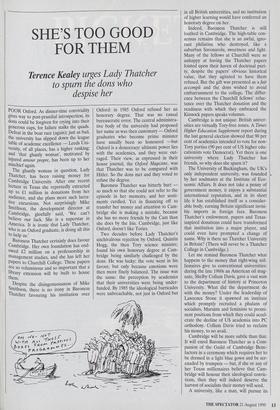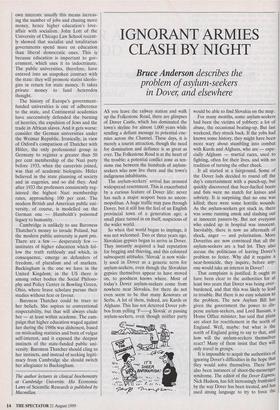SHE'S TOO GOOD FOR THEM
Terence Kealey urges Lady Thatcher
to spurn the dons who despise her
POOR Oxford. As dinner-time conviviality gives way to post-prandial introspection, its dons could be forgiven for crying into their generous cups, for failure stalks the quads. Defeat in the boat race (again); just as bad, the university has slipped down the league table of academic excellence — Leeds Uni- versity, of all places, has a higher ranking; and 'that ghastly woman', motivated by injured amour propre, has been up to her mischief again. The ghastly woman in question, Lady Thatcher, has been raising money for Cambridge University. After one recent lecture in Texas she reportedly extracted 1113 to £1 million in donations from her audience, and she plans more such lucra- tive excursions. Not surprisingly Mike Smithson, the development director at Cambridge, gleefully said, 'We can't believe our luck. She is a superstar in America. It is ironic that Lady Thatcher, who is an Oxford graduate, is doing all this to help us.'
Baroness Thatcher certainly does favour Cambridge. Her own foundation has end- owed £2 million on a professorship in management studies, and she has left her Papers to Churchill College. These papers are so voluminous and so important that a library extension will be built to house them.
Despite the disingenuousness of Mike Smithson, there is no irony in Baroness Thatcher favouring his institution over Oxford: in 1985 Oxford refused her an honorary degree. That was no casual bureaucratic error. The central administra- tive body of the university had proposed her name as was then customary — Oxford graduates who become prime minister have usually been so honoured —but Oxford is a democracy: ultimate power lies with the academics, and they were out- raged. Their view, as expressed in their house journal, the Oxford Magazine, was that Thatcher was to be compared with Hitler. So the dons met and they voted to refuse the degree.
Baroness Thatcher was bitterly hurt so much so that she could not refer to the episode in her memoirs, and her senti- ments curdled. Yet in flouncing off to transfer her money and attention to Cam- bridge she is making a mistake, because she has no more friends by the Cam than she does by the Isis. Cambridge, just like Oxford, doesn't like Tories.
Two decades before Lady Thatcher's unchivalrous rejection by Oxford, Quintin Hogg, the then Tory science minister, found his own honorary degree at Cam- bridge being similarly challenged by the dons. He was lucky: the vote went in his favour, but only because emotions were then more finely balanced. The issue was the same: the perception by academics that their universities were being under- funded. By 1985 the ideological barricades were unbreachable, not just in Oxford but in all British universities, and no institution of higher learning would have conferred an honorary degree on her.
Indeed, Baroness Thatcher is still loathed in Cambridge. The high-table con- sensus remains that she is an awful, igno- rant philistine who destroyed, like a suburban Savonarola, sweetness and light. Many of the fellows at Churchill were so unhappy at having the Thatcher papers foisted upon their haven of doctrinal puri- ty, despite the papers' obvious historical value, that they agitated to have them refused. But the gift was presented as a fait accompli and the dons wished to avoid embarrassment to the college. The differ- ence between the Churchill fellows' reluc- tance over the Thatcher donation and the readiness with which they embraced the Kinnock papers speaks volumes.
Cambridge is not unique: British univer- sities are virtually Tory-free zones. A Times Higher Education Supplement report during the last general election showed that 90 per cent of academics intended to vote for non- Tory parties (90 per cent of US higher edu- cationists vote Democrat). Yet there is one university where Lady Thatcher has friends, so why does she spurn it?
The University of Buckingham, the UK's only independent university, was founded by her soulmates at the Institute of Eco- nomic Affairs. It does not take a penny of government money, it enjoys a substantial international reputation, and in its short life it has established itself as a consider- able body, earning Britain significant invisi- ble imports in foreign fees. Baroness Thatcher's endowment, papers and Texas- inspired donations could have transformed that institution into a major player, and could even have prompted a change of name. Why is there no Thatcher University in Britain? (There will never be a Thatcher College in Cambridge.) Let me remind Baroness Thatcher what happens to the money that right-wing mil- lionaires give to conventional universities: during the late 1960s an American oil mag- nate, Shelby Collum Davis, gave a vast sum to the department of history at Princeton University. What did the department do with the money? Under the leadership of Lawrence Stone it spawned an institute which promptly recruited a phalanx of socialists, Marxists and feminists to promi- nent positions from which they could accel- erate the decline of US academia into PC orthodoxy. Collum Davis tried to reclaim his money, to no avail.
Cambridge will be more subtle than that. It will enrol Baroness Thatcher as a Com- panion of the Guild of Cambridge Bene- factors in a ceremony which requires her to be dressed in a light blue gown and be ser- enaded by trumpets — but, if she or any of her Texan millionaires believe that Cam- bridge will honour their ideological convic- tions, then they will indeed deserve the harvest of socialists their money will seed.
A university, like a man, will pursue its own interests: usually this means increas- ing the number of jobs and chasing more money, hence higher education's love- affair with socialism. John Lott of the University of Chicago Law School recent- ly showed that socialist and totalitarian governments spend more on education than liberal democratic ones. This is because education is important to gov- ernment, which uses it to indoctrinate. The public universities, therefore, have entered into an unspoken contract with the state: they will promote statist ideolo- gies in return for state money. It takes private money to fund heterodox thought.
The history of Europe's government- funded universities is one of adherence to the state, and Continental academics have successively defended the burning of heretics, the expulsion of Jews and the trade in African slaves. And it gets worse: consider the German universities under the Weimar Republic. Ironically, in view of Oxford's comparison of Thatcher with Hitler, the only professional group in Germany to register a greater than 50 per cent membership of the Nazi party before 1933, when the careerists joined, was that of academic biologists. Hitler believed in the state planning of society and in eugenics, and so did they. And after 1933 the professors consistently reg- istered the highest Nazi membership rates, approaching 100 per cent. The modern British and American public uni- versity, of course, is modelled on the German one — Humboldt's poisoned legacy to humanity.
Cambridge is unlikely to use Baroness Thatcher's money to invade Poland, but the modern public university is parti There are a few — desperately few — institutes of higher education which fol- low the truth ruthlessly and which, in consequence, emerge as defenders of freedom, of pluralism and of markets. Buckingham is the one we have in the United Kingdom; in the US there is among other bodies the Social Philoso- phy and Policy Center in Bowling Green, Ohio, where brave scholars pursue their studies without fear or favour.
Baroness Thatcher could be truer to her beliefs. She aspires to conventional respectability, but that will always elude her — at least within academe. The cam- paign that higher education waged against her during the 1980s was dishonest, based on misleading statistics and born of vulgar self-interest, and it exposed the deepest instincts of the state-funded public uni- versity. Baroness Thatcher should cling to her instincts, and instead of seeking legiti- macy from Cambridge she should switch her allegiance to Buckingham.
The author lectures in clinical biochemistry at Cambridge University. His Economic Laws of Scientific Research is published by Macmillan.



























































 Previous page
Previous page